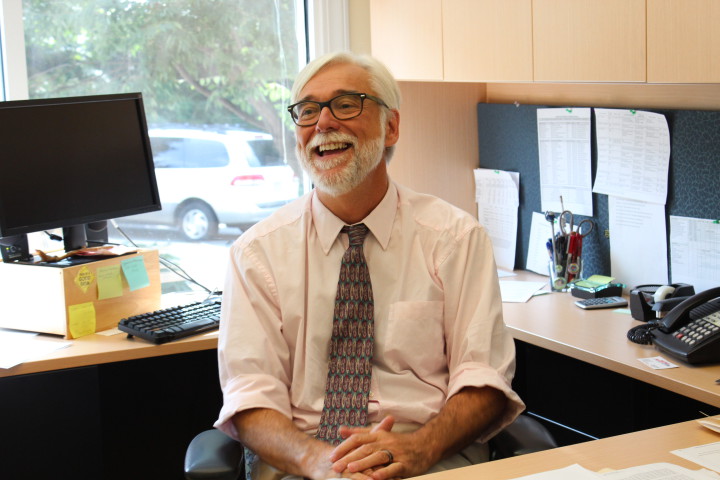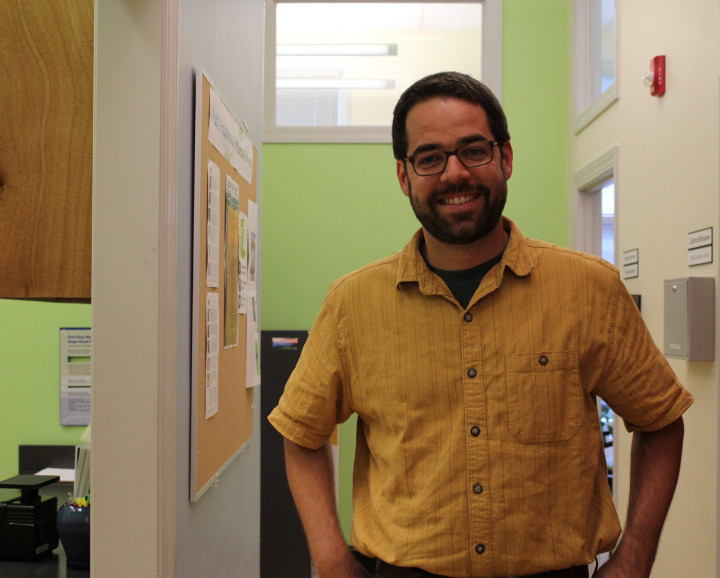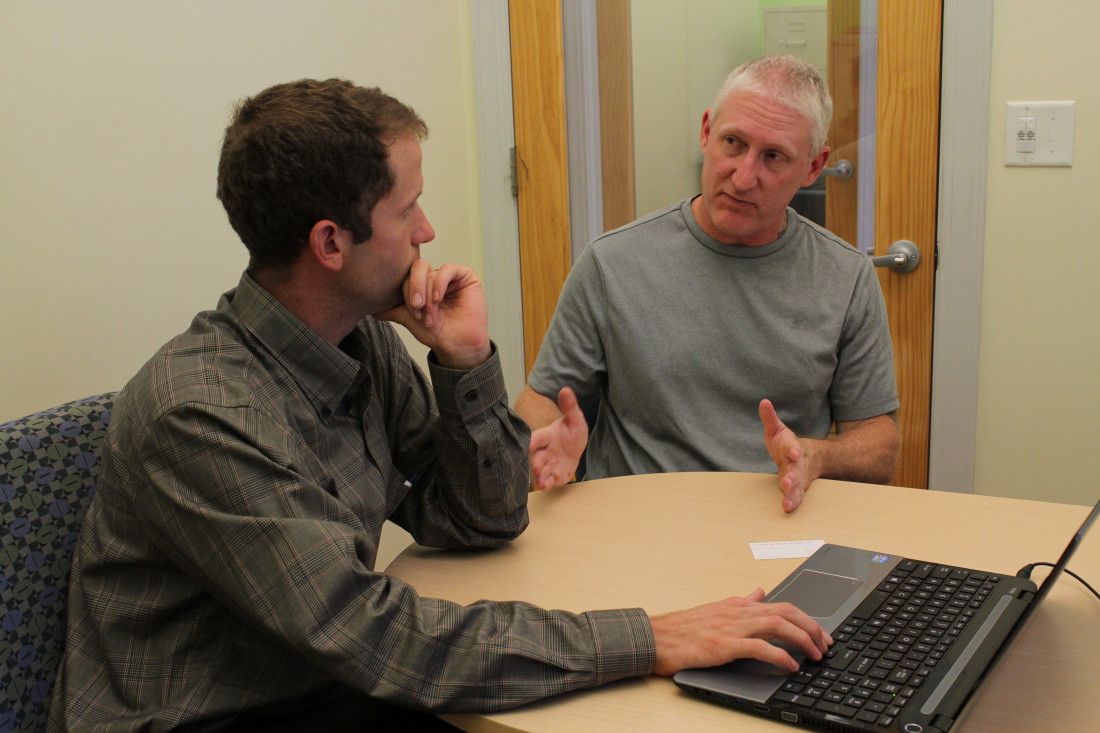Two years ago, Keith Wimsett felt stuck. The personal trainer and gym owner had 28 monthly clients on the roster — enough to survive day to day, but not enough to sustain his 2,500-square-foot Riverside Drive facility over the long haul.
“I’m passionate about fitness, not about business,” says Wimsett, who enjoys working one-on-one with clients and developing individualized plans for them.
But that approach made Mountain BizWorks a natural fit for Wimsett. After assessing his 6-year-old business’ strengths and weaknesses, Wimsett’s coach at the nonprofit helped him create a plan for rebranding his services.
In January, Wimsett rolled out his new business name — Inspire Personal Fitness — along with a new logo and website. He’s now up to 75 clients, and he’s back at Mountain BizWorks for more coaching, this time to figure out how to manage his recent growth.
“Keith is very eager to learn,” says Barry Gupton, Wimsett’s current coach. The business finance specialist works with 15 to 20 clients at a time, giving them the tools and support needed to create sustainable enterprises.
The nonprofit’s client list includes such iconic Asheville brands as LaZoom Tours, The Organic Mechanic, FLS Energy and French Broad Chocolates, among many others. But in the fall of 2013, Wimsett didn’t know if Mountain BizWorks would be around long enough to help him take his business to the next level.
A painful restructuring
That year, a sudden funding crisis threw the long-running nonprofit into a tailspin. An expected grant failed to come through, and just like that, the organization found itself struggling to survive. CEO Shaw Canale resigned, half the staff were laid off, programs were cut and, in July of 2014, Patrick Fitzsimmons took over as Mountain BizWorks’ executive director.
A former regional director for the American Red Cross, Fitzsimmons was no stranger to disaster, but what he confronted now was different from a flood or fire; he led an additional belt-tightening effort that he calls “so painful.”
Longtime board member Bill Carrington, who works as a regional director at the Self-Help Credit Union, says the months following that restructuring were hard. “Many board members went way above and beyond what would usually be expected” to help the organization hang on, recalls Carrington, who took over as board chair in June.

But trimming expenses could go only so far. The real root of the crisis was an over-reliance on grant funding, notes retired financial professional Fred Waldkoetter, who joined the board in June of 2014 to help with the restructuring. In the nonprofit world, he explains, self-sufficiency refers to the amount of revenue derived from earned income — in this case, the interest and fees from the loans Mountain BizWorks makes. At the time of the crisis, the organization was relying on grants for almost 80 percent of its revenue.
One of the casualties of the restructuring was the popular Foundations business planning course. Rather than shut it down entirely, however, Mountain BizWorks contracted with former staffer Annie Price’s firm, Birds Eye Business Planning & Consulting, to revamp and run the program. Price zeroed in on the most critical topics for new business owners, shortening the course from eight weekly sessions to six.
Demand for the classes, held at Mountain BizWorks’ South Lexington Avenue offices, has been strong. With 15 participants, the current session is at capacity; two concurrent sessions are planned for this fall.
The secret sauce
Having handed off its flagship group education component, Mountain BizWorks now focuses on two key areas: coaching and lending.
Fitzsimmons calls coaching the “secret sauce” his organization uses to help create jobs and economic opportunity. Coaches get to know clients and their businesses well, so when one of them applies for a loan, the nonprofit is well positioned to gauge both their readiness and the appropriate amount of funding.
“We provide a level of hand-holding that larger banks aren’t set up to offer,” notes Fitzsimmons, who credits that kind of personalized guidance with limiting the institution’s 2014 loan loss rate to just 1 percent (2.2 percent over the last three years).
Coaching is free for clients who meet certain criteria; others pay a fee based on their business’ size. Eric Seiler, a Rolfing and yoga therapist, says the fees are “very affordable” for a small business. He chose coach Bob Perlstein from Mountain BizWorks’ list of two dozen specialists, all of whom are entrepreneurs themselves.
Loans, meanwhile, provide capital to people seeking to start or expand a small business. The money comes from various sources: the U.S. Small Business Administration, the U.S. Department of Agriculture’s Rural Development program, foundation grants, donations, local investors and returns on its existing loan portfolio.
“We live by our funding,” says Carrington. Accordingly, the nonprofit is trying to diversify its sources. “We’re getting better, but we’re not out of the woods yet,” he reports. Applying for grants is a complex process, and funders’ decision-making criteria can be opaque, notes Carrington, adding that it’s still not clear precisely why the organization failed to secure the grant that triggered the 2013 crisis.
So far this year, Mountain BizWorks has lent local entrepreneurs $1 million in Small Business Administration funds. In April, the SBA approved an additional $1.25 million allotment, and the nonprofit is waiting on Congress to release that money.
Meanwhile, Mountain BizWorks receives about three dozen loan inquiries per month, Fitzsimmons reports. This spring was especially busy, with 54 inquiries in April and 50 more in May. The nonprofit generally makes about 10 loans per month.
Businesses turned down for loans may be offered coaching or steered toward group education. “‘No’ doesn’t mean ‘never,’” says Fitzsimmons; some businesses aren’t ready yet, but his organization can help them address what’s lacking to improve their chances of accessing capital.
New blood
As Mountain BizWorks celebrates its 25th year of creating economic opportunity in the region, AdvantageWest, a state-funded economic development entity, is winding down after a 21-year run. The latter organization “received 60 to 80 percent of its operating funds from the state of North Carolina,” explains Matt Raker, the agency’s former vice president of entrepreneurship. When those funds were cut off, he says, AdvantageWest had no choice but to close.
In July, Raker joined Mountain BizWorks as director of community investments. He brought with him two programs in need of a new home: the Advantage Opportunity Fund and ScaleUp WNC.
Mountain BizWorks was already servicing loans and supplying administrative support for the Advantage Opportunity Fund, making the transition seamless, says Raker. The fund offers startup or early stage capital to companies that have the potential for rapid growth and job creation, particularly those in rural counties.
Now completing its first year, ScaleUp WNC is funded by a five-year, $1.2 million SBA grant — one of only eight such awards nationwide. Each year, ScaleUp will provide instruction, mentoring and support for 30 small businesses.
Those clients, notes Raker, “need a focused, quick, intensive program they can access while continuing to run their businesses.”
Participants attend eight classes, prepare a strategic business plan and receive individual mentoring. The program culminates in a multimedia presentation showcasing each business to a community audience. The most recent presentations were held at The Orange Peel on May 26.
Raker sees tremendous need to continue these programs. “Over the last several years, there’s been less and less capital available for small businesses,” he points out.
Fitzsimmons, meanwhile, says the programs Raker brought with him are a great fit with Mountain BizWorks’ mission and focus. Like the nonprofit’s other programs, he continues, these latest additions receive no state funding. And in light of what happened to AdvantageWest, Fitzsimmons considers that “a very good thing.”

Investing in community
On Aug. 15, Mountain BizWorks launched its newest initiative, Childcare Business Training, in partnership with the Self-Help Credit Union and Smart Start of Buncombe County.
Although Smart Start trains providers in child care and child development, business training has been lacking, says Ariel Ford, director of child care resources and referrals at Smart Start. The new program uses a curriculum developed by the credit union specifically for owners of child care businesses. Jane Hatley, a regional director at Self-Help, trained six Mountain BizWorks coaches in the curriculum.
“This course is part of a holistic effort to bring more attention to the importance of a strong child care network as a driver of economic growth,” Ford explains. “Businesses benefit when their employees have access to high-quality, affordable child care.”
Wanda Winslow has operated Wanda’s Childcare Home in Kenilworth for 15 years; she’s taking the course to stay current. “In this fast-paced world, everything seems to be changing,” she says. “I need to know about things like the Affordable Care Act and how to market my business on the Internet.”
Winslow, whose business is licensed to care for five infants or toddlers and three school-aged children, says she has little opportunity to network with other care providers. Her facility is open 50 hours a week, and she has no assistant. “I’m out here on my own, so it’s good to hear what others are doing,” she says.
The eight half-day Saturday sessions are being held at Mountain BizWorks, and two participants haven’t launched their businesses yet. “If a new child care business can make it for three years,” says Winslow, “then they can keep it going.” In the past, she received counseling through the SCORE program — an advantage many care providers haven’t had.
Ford, meanwhile, says the new course will cover a range of business topics while connecting participants with coaches who can provide ongoing mentoring and training.
For her part, Winslow says she loves her line of work, despite the challenges and isolation. “It’s truly amazing to do this. If a child feels really loved in those early years, it lays the foundation for success later on.”
Ford couldn’t agree more. “The first 2,000 days of human life are critical,” she notes. “Supporting child care providers with business training and counseling is an investment that will pay dividends throughout the community.”
Keeping it local
Fitzsimmons believes Asheville’s entrepreneurial businesses are the bedrock of the city’s unique character. “We are not like every other town in America,” he says, and Mountain BizWorks has been an important force in supporting the businesses that have shaped this city’s identity. In last year’s Mountain Xpress Best of WNC readers’ poll, he points out, 83 of the winners were Mountain BizWorks alumni. In 2013, 93 were current or former Mountain BizWorks clients.
Last year, the nonprofit originated 61 new loans totaling $1.1 million. At the end of 2014, its portfolio comprised 166 loans with a combined value of $3.3 million. The interest and fees on those loans provided 47 percent of the organization’s operating revenue, with federal, state and city grants, plus foundation and individual support, making up the rest.
The bottom line? Mountain BizWorks ended 2014 in the black, with a net income of $109,309. But that’s only the beginning, says Fitzsimmons: 320 existing jobs were retained and 142 new ones created; 96 businesses were sustained, while 45 new ones came into being as a result of Mountain BizWorks programs; and 312 clients received business coaching.
Meanwhile, the nonprofit’s individual investor program offers community members a way to support local businesses. The risk is low, because the investors contribute to Mountain BizWorks’ total loan portfolio, rather than funding a particular business. Participants choose a fixed, below-market interest rate and term for their investment, and many decline to take even the maximum available return, notes Raker, so that more of their money can help loan recipients.
Part of Raker’s job is developing new ways to attract community investors. One possibility, he says, would be putting together funds that focused on a particular business sector, such as food or tourism, instead of simply having investors support the overall portfolio.
Brighter days ahead
Throughout its ups and downs, Mountain BizWorks has been a source of support for local businesses that no other lender would touch, says Fitzsimmons.
Even during the crisis, remembers Wimsett, the organization reassured clients that it would be around for the long haul.
But though both staff and board aim to ensure a sustainable future for the organization, the perpetual uncertainty concerning funding makes that “a lofty goal,” says Carrington.
If the future is always somewhat dicey, however, he believes the organization now has the staff it needs to do the job. The current team, notes Carrington, “has expanded our knowledge of grant sources and sharpened our skills for applying. We’ve also gone back to some funders that passed us over a year or two ago; they’ve been open to receiving new grant applications from us.”
And in the meantime, he continues, “The proof is in the numbers, and they get better every month.”
Waldkoetter, who now works pro bono as the organization’s chief financial officer, agrees. These days, he says, “We are much less reliant on grant funding for our liquidity. From that standpoint, we’re a much stronger organization.”




Before you comment
The comments section is here to provide a platform for civil dialogue on the issues we face together as a local community. Xpress is committed to offering this platform for all voices, but when the tone of the discussion gets nasty or strays off topic, we believe many people choose not to participate. Xpress editors are determined to moderate comments to ensure a constructive interchange is maintained. All comments judged not to be in keeping with the spirit of civil discourse will be removed and repeat violators will be banned. See here for our terms of service. Thank you for being part of this effort to promote respectful discussion.